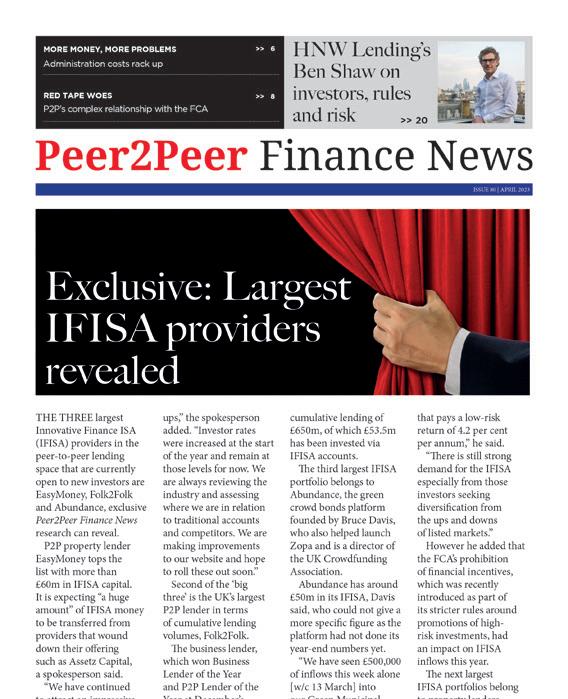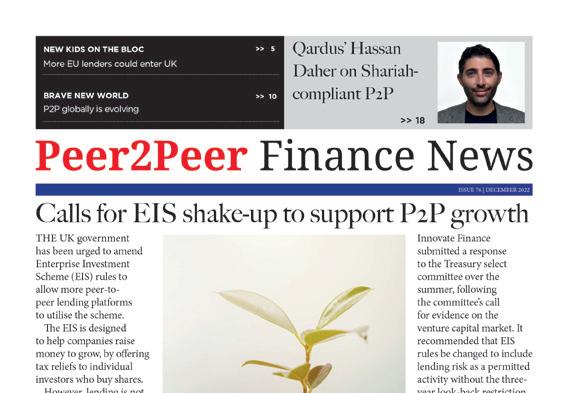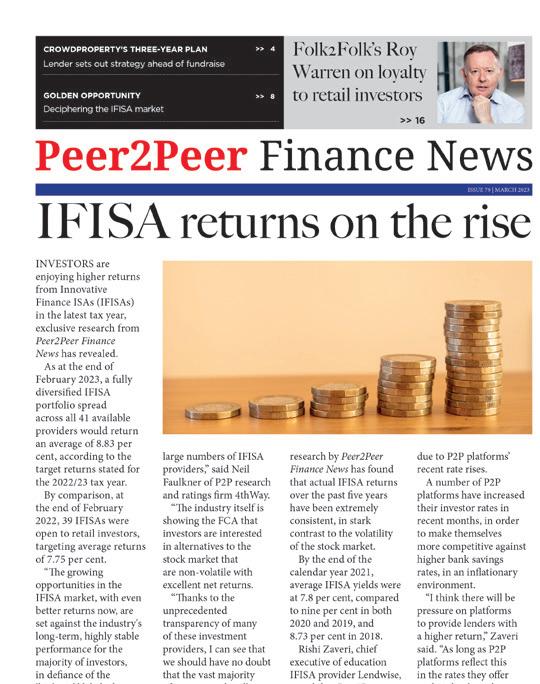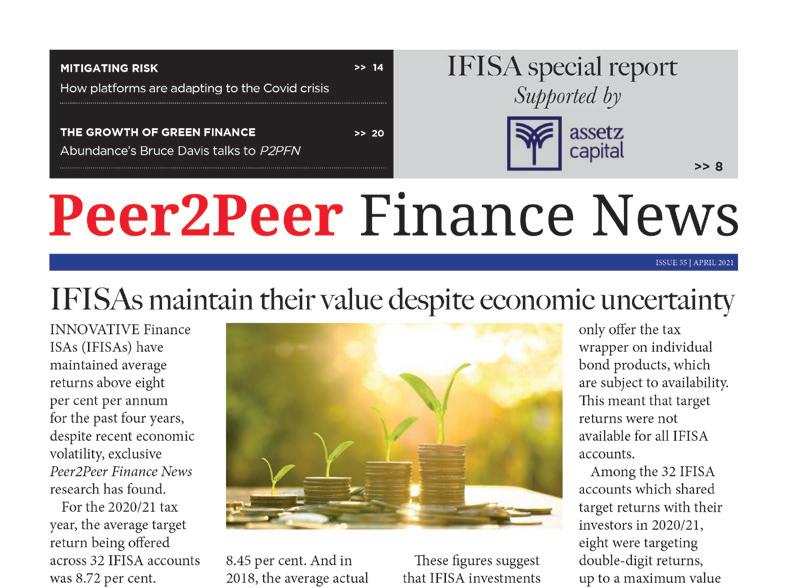Revealed: Secret talks underway to roll back financial promotion rules

REPRESENTATIVES from the peer-to-peer lending community have been in secret talks with government officials and regulators about rolling back some of the new financial promotions rules, Peer2Peer Finance News can exclusively reveal.

A number of closed door meetings have already taken place to discuss the impact that the new regulations have had on the P2P sector and retail investors.
Peer2Peer Finance News understands that approximately 30 Financial Conduct Authority (FCA) representatives attended a meeting with P2P industry executives in May to discuss the impact of the rules. Platforms shared data with the regulator showing that some of the changes are having a negative impact on their business by discouraging would-be investors.
“We raised our concerns and wanted to try to understand how the
FCA would view the data that we have and whether this is a problem in terms of policy,” said one P2P stakeholder who attended the meeting.
The FCA was described as being “defensive” in its response.
“Addressing the harm from high risk investments is a key part of our consumer investments strategy,” the FCA has previously said.
“Long term social and economic changes have made the consumer investment market more important than ever. Consumers are increasingly responsible
for making complex decisions about how they invest their long term savings for life events and to support themselves in later life. There is more choice of products and services than ever before. It is increasingly easy to target consumers with adverts for high risk investments online.”
The regulator has previously stated that its long-term aim is to improve consumer outcomes by halving the number of vulnerable people who are making inappropriately highrisk investments.
Last year, the FCA
unveiled new financial promotion rules for highrisk investments, which were designed to ensure that only suitable investors access these products. All P2P platforms now have to carry a prominent risk warning on their website, investor incentives have been banned and the requirements around appropriateness tests have been strengthened.
The risk warnings came into effect last December, and all other rules came into effect on 1 February this year.
The most controversial rule involves a 24-hour cooling off period. This begins when the consumer requests to view a direct offer financial promotion. From this point, P2P lending platforms are not allowed to show consumers the relevant financial promotion until at least 24 hours have elapsed. However, they can proceed with other parts of the consumer journey, including >>
4 ISSUE 82 | JUNE 2023
HONEY
>> >> 5 16
THE ROBOTS ARE TAKING OVER How AI can boost P2P lending
FOR THE BEES The secrets of customer acquisition
Innovate Finance’s Mike Carter on the future of P2P
14 >>

Published by Royal Crescent Publishing
124 City Road, London, EC1V 2NX info@royalcrescentpublishing.co.uk

EDITORIAL
Suzie Neuwirth
Editor-in-Chief suzie@p2pfinancenews.co.uk

Kathryn Gaw
Contributing Editor kathryn@p2pfinancenews.co.uk
Marc Shoffman Senior Reporter marc@p2pfinancenews.co.uk
PRODUCTION
Tim Parker
Art Director
COMMERCIAL
Tehmeena Khan Sales and Marketing Manager tehmeena@p2pfinancenews.co.uk
SUBSCRIPTIONS AND DISTRIBUTION tehmeena@p2pfinancenews.co.uk
Find our website at www.p2pfinancenews.co.uk
Printed by 4-Print Limited ©No part of this publication may be reproduced without written permission from the publishers.
Peer2Peer Finance News has been prepared solely for informational purposes, and is not a solicitation of an offer to buy or sell any peer-to-peer finance product, or any other security, product, service or investment. This publication does not purport to contain all relevant information which you may need to take into account before making a decision on any finance or investment matter. The opinions expressed in this publication do not constitute investment advice and independent advice should be sought where appropriate. Neither the information in this publication, nor any opinion contained in this publication constitutes a solicitation or offer to provide any investment advice or service.
It’s no secret that the relationship between the industry and the regulator is difficult and complex. Some stakeholders feel that the Financial Conduct Authority (FCA) is trying to kill off retail peer-to-peer lending with overly onerous restrictions, while the regulator insists it is simply trying to protect consumers from harm.
While I was pleased to hear of secret meetings taking place between both parties to discuss the impact of the new financial promotions rules on the sector, it’s a shame that not much appears to have been achieved.
However, the fact that 30 individuals from the FCA granted the P2P industry some airtime is promising, and I’m hopeful that the regulator may go away and consider some of the arguments posed in those meetings.
We’ll be keeping our ears to the ground, so make sure to continue reading Peer2Peer Finance News for further updates on the regulatory landscape.
SUZIE NEUWIRTH EDITOR-IN-CHIEF
We hope you’re enjoying the latest edition of Peer2Peer Finance News! We have now moved to a paid-for subscription model. If you would like to continue reading the magazine, please go to www.p2pfinancenews.co.uk/subscribe/ to find out about subscription options.
03 EDITOR’S LETTER
cont. from page 1
carrying out anti-money laundering checks and the aforementioned appropriateness assessment.
P2P stakeholders claim that this 24-hour cooling off period goes too far, and is actively discouraging people from investing in P2P loans, even where P2P lending would be a good fit for them.
“That customer journey is having a really big impact on our ability to market our products to new customers,” said a P2P stakeholder who attended the May meeting.
Attendees at the meeting are believed to have focused on this 24-hour rule, with the aim of having it removed completely.
In 2021, the FCA stated an aim to “reduce by 20 per cent the number of consumers who could benefit from investment
earnings but are missing out.” P2P stakeholders claim that the financial promotion rules do not support this aim.
Over the past few months, P2P platforms have been submitting data to the UK Crowdfunding Association (UKCFA) which shows how the 24hour cooling period and other financial promotion rules are causing fewer investors to diversify their cash and investment holdings into P2P.
“We are engaging with the FCA on this issue directly and have raised our concerns with the policy team,” said a UKCFA spokesperson.

“We will continue to engage both with the FCA and with the Treasury if we don’t see significant engagement with our concerns.
“At this point we are exploring all options to represent our concerns whether that’s to the regulator or the Treasury.”
Indeed, Peer2Peer Finance News is aware that City minister Andrew Griffith has spoken with at least one P2P representative about the sector’s concerns around the financial promotion regulation.
Griffith has been vocal in the past about his support for the fintech sector. Earlier this year it was reported that Griffith was “scathing” about the FCA’s upcoming consumer duty, arguing that it could be harmful to the financial services sector.
“We would like to see a review of the rules to make sure that they’re fulfilling the stated objectives,” added the UKCFA spokesperson.
“We believe that the rules go too far at present.”
The FCA did not respond to requests for comment.
Kuflink offers rate boost on extended loans
KUFLINK is offering a rate boost to anyone who is invested in a loan that has had its term time extended. Effective immediately, all investors will receive higher rates on any loan where the borrower rate has also been increased. This typically happens when a loan as been extended, or where default interest is being charged.
Previously, investors received the same interest rate on all loans, regardless of whether the borrower rate had changed.
“We have introduced increased interest rates for investors on loans that are given an extension where the interest rate charged to the borrower also increases,” said Paul
Auger, chief operating officer at Kuflink.
“We are also looking at paying increased rates to investors for loans that are incurring default interest, but this is still in development. It is a complicated process due to the technical issues around the process and the IT.”
Kuflink regularly contacts its customers for feedback
and several investors said they wanted to see higher returns passed on to them when the borrower rate is increased.
In 2022, 8.5 per cent of Kuflink’s loans were repaid late. In 2023 to date, 11.7 per cent of the platform’s loans have been paid late. Since the company’s inception, no investor has ever made a capital loss.
NEWS 04
AI presents opportunity for P2P firms
NEW artificial intelligence (AI) tools such as ChatGPT and Google Bard have been making headlines for showing how machines can write poetry and even pass law exams, but the machine learning (ML) technology also has plenty of practical uses in peer-to-peer lending.

Tomaso Aste, professor of complexity science and director of the UCL Centre for Blockchain Technologies suggests AI can improve credit risk models by predicting loan rejection and default risk using existing P2P platform datasets.
He co-authored a recent study based on a decade of LendingClub data that found AI can reduce the default risk of issued loans by as much as 70 per cent.
“There is a great opportunity here,” he told Peer2Peer Finance News
“It is not only the P2P sector but lending in general. Automation – reliable automation – can allow small or micro financing in a way previously impossible.”
P2P lenders in the UK are starting to get on board, using AI to improve their processes on both the borrower and investor sides of the business.
Kuflink has signalled that it is working on AI-focused products for
due diligence, collections, compliance and risks. The property lending platform has said it is building algorithms to help predict future trends based on historical data.
Sharia finance-focused P2P lender Qardus uses ML for credit risk scoring, while Crowd2Fund’s automated investing tool SmartInvest incorporates AI and was built following talks with Murray Shanahan, professor of cognitive robotics at Imperial College as well as technology leaders from
IBM and Microsoft.
Analysts from European platform Robo.cash have predicted that AI and ML will boost the growth of the P2P lending sector during 2023.
Robo.cash attributed this to P2P lenders being “increasingly aware of the benefits of using technologies and integrating them into their business.”
However, Brian Bartaby, chief executive of Proplend highlights that AI is only as good as the data lake it feeds from.
“Where it can be used for simple repetitive tasks, it may be useful but for something as important as underwriting, I doubt it,” he said. “Many lenders who have attempted autounderwriting have failed spectacularly.”
Innovate Finance’s Carter heralds retail demand for alternatives
THERE is strong retail demand for alternative investment regardless of the entity’s structure, according to Mike Carter, policy lead for lending platforms at Innovate Finance.
Speaking to Peer2Peer Finance News, Carter said the trade body is “very positive about retail P2P lending”, heralding it as a “great example of fintech innovation”.
However, he conceded
that it is “a more restricted universe of investors” and highlighted the fact that other alternative investment platforms that are not technically P2P are also seeing interest from retail investors.
“There are many other constructs for accessing retail investors – see for example AxiaFunder,” Carter said. “This shows that there is retail demand for alternative investment
as investors don’t care too much about the investment structure, they are more interested in the asset class and the quality of the asset.”
AxiaFunder is a litigation crowdfunding platform that puts investors’ funds into a special purpose vehicle that is used to finance the litigation, rather than operating under a P2P model.
A number of larger
P2P platforms have exited the retail space in recent years, but Carter heralded the achievements of the current cohort of retailfriendly P2P firms.
“They are delivering returns they said they would deliver,” he said. “This is important as investors want to get what they expect.
Go to page 14 to read the full interview with Carter.
05 NEWS
•





The world’s leading resource on peer-to-peer lending Subscribe today for full online access Peer2Peer Finance News (p2pfinancenews.co.uk) is the premier source of in-depth news, analysis, and insights on the fast-growing peer to peer lending industry. As a subscriber, you’ll have access to:
High-quality coverage of key topics impacting the P2P industry and its investors.
•
Up-to-the-minute news, features and opinions from P2P lending experts and industry professionals.
Daily news and analysis from Monday to Friday, and daily and weekly newsletters. Subscribe for just £1 for the first three months!* £9.99/month thereafter. Cancel anytime. Go to https://p2pfinancenews.co.uk/subscribe to sign up now.
•
Assetz Exchange: 7pc yield is sweet spot for P2P loans
SEVEN per cent is the sweet spot for peer-topeer lending yields in the current high interest rate environment, says Peter Read, director and founder of Assetz Exchange.
Following a series of Bank of England base rate hikes, Read noted that P2P lending platforms are now competing against FSCSprotected cash savings and cash ISA accounts which are offering returns of up to five per cent. In order to remain competitive, many P2P lenders have increased their lender returns, including Assetz Exchange.
“We realised that we had to increase our yields significantly,” Read told Peer2Peer Finance News.
“People want to get that premium so we launched two properties in January at six per cent net yield and then we did one in March at 6.5 per cent. They took a bit longer to go. Then in April, we listed a loan at 7.5 per cent and it was our fastest-selling loan ever.

“When the yield is above seven per cent, it seems that people are more likely to invest.”
A number of UKbased P2P lenders have also increased their rates
above the seven per cent mark in recent months.
Folk2Folk increased its target returns from 6.5 per cent to as much as 9.5 per cent, while JustUs raised its rates by 0.5 per cent in February, meaning that most of its loans are now targeting 8.5 per cent in returns. Also in February, Kuflink increased its target rates to 9.73 per cent, from 8.05 per cent previously. And last month, P2P pawnbroking platform Unbolted
increased its target lender rates from eight per cent to nine per cent.
“Since the Bank of England put the rates up, it’s been tough,” adds Read. “If you think about it people were getting 1.5 per cent on fixed-term cash ISAs this time last year while we were offering five per cent, so we were getting lots of transfers in from cash ISAs.
“But now the Bank of England has increased its rates to 4.5 per cent and Barclays are offering cash savings accounts paying five per cent. You aren’t getting that flow from the cash ISA any more because people would rather have the protection of the FSCS.”
P2P firms poised to provide development exit finance
PEER-TO-PEER
lenders have signalled a willingness to provide development exit finance, amid predictions of rising demand due to a slowdown in the property market.
Michael Minnie, senior business development manager at LendInvest, last month noted that “rising costs and rising interest rates have been putting people off buying houses”.
This, in turn, can result in a longer wait for sales for developers, thus
increasing the need for a short-term bridging facility to pay off an outstanding loan on the project.
This is an area that P2P lending platforms are aware of and open to serving as well.
Paul Sonabend, executive chairman of Relendex, said the lender will offer development exit finance to its existing borrowers.
“The rationale is that Relendex builds longterm relationships with our borrowers and works with them to
ensure they maximise their profits,” he told Peer2Peer Finance News
“Once a development is complete it is substantially de-risked. Development exit finance is therefore cheaper than development finance. It also unlocks value in a development that can be used by the developer to fund new projects.”
He said such a loan is assessed on the same strict criteria as the original loan with updated valuations.
Meanwhile, Invest & Fund said it is seeing
favourable and steady transaction rates but does offer development exit finance if required.
The platform said it works closely with borrowers to ensure their schemes are well-managed and not overly leveraged.
“Whilst it's obvious there is a complex economic backdrop, the active and adaptable management of our client's projects provides significant comfort to our investors,” Alan Fletcher, partnership director at Invest & Fund, said.
07 NEWS





2023
How Kuflink aced the B Corp test
EARLIER THIS YEAR, Kuflink joined an exclusive group of companies that are leading the world in terms of environmental, social and corporate governance (ESG).
196,000 companies from across the world have applied for B Corp status, but the full B Corp certification has been awarded to just 6,658 companies – that’s a success rate of just 3.4 per cent.
Yet Kuflink not only passed the certification test, it exceeded every parameter set by the B Lab.
Based on the B Impact assessment, Kuflink earned an overall score of 90.6. The median score for ordinary businesses who complete the assessment is currently 50.9. A score of 80 qualifies for B Corp certification.
For Kuflink’s chief operating officer Paul Auger (pictured), this result is a testament to the peer-to-peer lending platform’s long-running commitment to ESG at every level of the business.

“Achieving B Corp status is important to Kuflink Group’s commitment to social and environmental responsibility,” says Auger.
“Kuflink Group is taking steps to impact society and the environment and generate financial returns positively. Kuflink Group’s plans involve continuing to prioritise ESG principles and integrate them into our business model further.”
ESG metrics are becoming increasingly important to retail and institutional investors, and B Corp status is a quick and easy way to assess a company’s ESG status. B Corp certification is a long process which tests companies on their
ability to demonstrate high social and environmental performance, and pass a risk review. Companies must make a legal commitment to their corporate governance structure to be accountable to all stakeholders, not just shareholders. They must also exhibit transparency by publicly sharing information about their performance.

By the time Kuflink began its B Corp application process in January 2022, the company was already well on its way towards meeting these standards.
“Kuflink Group’s commitment to social and environmental responsibility goes beyond meeting the minimum B Corp certification standards,” explains Auger.
“For example, we established multiple committees in 2018 and 2019 (prior to our B Corp application) to strengthen our governance.
“Furthermore, our chief executive was happy to show profit/loss monthly management figures, audited accounts, and other financials on our ESG
page to benefit our stakeholders, including our investors, staff, partners and shareholders.”

Just a handful of P2P lending and crowdfunding platforms have received B Corp certification, but Auger believes that the P2P business model should be a natural fit for the B Corp scheme.
“P2P platforms are well-suited to the ESG investment market because they provide an alternative source of financing that aligns with ESG principles,” he says.
“P2P lending allows investors to support companies that are committed to creating a positive impact on society and the environment while also generating financial returns.”
Since obtaining B Corp status in April, Kuflink has seen an influx of new investors who are keen to add an ESG tilt to their portfolios. But the platform is not resting on its laurels just yet.
“Kuflink Group is committed to continuing to prioritise ESG principles, and we plan to build on our current initiatives to create an even greater positive impact on society, the environment,” explains Auger.
“Every day there is always something new. We are especially proud of how the team participated in this process, from sharing experiences of taking in Ukraine families to buying environmentallyfriendly products for company use.”
This commitment to always do better and prioritise people over everything helped Kuflink to ace its B Corp test, and will ensure that the company remains on the radar of all ESG-focused investors for a long time to come.
09 JOINT VENTURE
Inflated expectations
High inflation and the rising base rate are wreaking havoc with the UK’s property market. Kathryn Gaw asks how peer-to-peer property lenders are responding to the challenge.

THE RISING BASE RATE affects just about every corner of the UK economy, but perhaps none more so than the property sector.
Millions of people are already facing higher mortgage repayments, while property developers are struggling to source financing from traditional lenders. Those borrowers who do secure funding are being hit with higher rates, which in turn can lead to a higher risk of default.
Over the past few months, peerto-peer property lending platforms
have had to find a balance between offering competitive returns to investors and setting fair rates for borrowers. Even for experienced lenders, this can prove challenging.
One platform chief told Peer2Peer Finance News that the base rate hikes have caused more issues for property lenders than the pandemic. Meanwhile, other platforms have reported lower investor demand for loans offering returns which are below the rate of inflation –10.1 per cent as of March 2023. While some property development
platforms are still advertising rates of around 15 per cent, the majority of lenders are stuck between a rock and a hard place, trying to attract new investors without pricing their borrowers out of the market.
“Default rates are going up,” says Filip Karadaghi, managing director of LandlordInvest.
“Virgin Money just increased its bad debt provision by seven times compared to last year so it looks as if it will only accelerate.
“LandlordInvest should be able to withstand it as most of our
10 PROPERTY
borrowers have been active for many years and have significant portfolios as a cushion.”
Karadaghi believes that the key risk of P2P property lending in 2023 is “more difficult conditions due to the high persistent inflation rate.” This is a view that is echoed across the P2P property sector.
Atuksha Poonwassie, managing director and co-founder of Simple Crowdfunding, says that she does not believe that P2P property lending is inflation proof, and noted that many platforms –including Simple Crowdfunding – have felt pressed to raise rates in order to remain competitive.
“Overall, interest rates for P2P loans have gone up in light of market conditions,” says Poonwassie.
“Our first charge loans are averaging 10 per cent, with our second charge loans averaging 14 per cent.”
Simple Crowdfunding is not the only property lender to raise its target lender returns in recent months. Loanpad, Assetz Exchange, CapitalRise, and Folk2Folk are just a few of the platforms which have responded to rising inflation by hiking their rates. But as the old adage goes, higher returns usually means higher risk. So what are the key risks of P2P property investing in the age of double digit inflation?
“Across the board there is less funding available and what is available is more expensive,” says Brian Bartaby, founder and chief executive of Proplend.
“In residential, the key risk is
borrowers being unable to afford rising mortgage payments during a cost-of-living crisis. In residential development, the risk is developers dealing with rising material and labour costs and availability of labour, then selling into a market struggling with higher interest rates and a cost-of-living crisis.

“For commercial borrowers and landlords it is being able to retain tenants and being able to lease and release vacant properties.
“For all borrowers being able to refinance properties at the end of their current loan terms, fewer lenders, less financial products and higher interest rates.”
11 PROPERTY
“
Across the board there is less funding available and what is available is more expensive”
Luckily, P2P platforms have an extensive tool kit at their disposal to deal with these problems.
P2P platforms pride themselves on their due diligence and creditchecking technology, and rightly so. Despite years of economic instability, preceded by a global financial crisis and UK recession, P2P property lenders have been able to maintain relatively low default rates across the board. In fact, the four largest P2P property platforms – Folk2Folk, Kuflink, CrowdProperty and EasyMoney – have all maintained an impressive track record of zero capital losses to investors. This is a credit to their strict onboarding processes, and strong reputation in the borrower community.
These due diligence processes are particularly valuable when it comes to property development loans. Unlike banks, P2P lenders are known to take a hands-on approach towards development projects, sending building experts on site visits, offering flexible repayment terms and building long-term relationships with smalland medium-sized housebuilders which ensures a steady flow of future loans. But there are still many variables in property development, from the pace of work at the site, to delays in the development schedule, to the state of the overall economy and how it is influencing buying and selling behaviour.
“Most of these issues can cause delays in planned timetables so this is probably something to bear in mind for 2023,” says Karteek Patel, chief executive and co-founder of Crowdstacker.
“However, whilst delays are probably one of the key risks, investors can mitigate this to some degree by looking for investments
where timescales, loan terms and planned works look comfortable, and experienced developers who are more likely to have factored these issues in from the start.”
There are several segments within the property lending sector, and some are proving to be more popular and inflation-proof then others. Uma Rajah, founder and

chief executive of CapitalRise, says that the prime property market has seen “strong performance in spite of recent economic uncertainty.”
“This is driven by a few factors,” she says. “Namely the natural constraints on property supply, particularly in prime London areas, and high demand, especially from overseas buyers who appreciate the relative value of GBP purchases.”
In fact, CapitalRise has seen a 125 per cent increase in its live loan facilities over the past year.
“Prime property lending –especially in London – operates independently of the overall
12 PROPERTY
“
No complex asset class is really inflation-proof”
UK property market,” says Rajah. “Because of this we are seeing increasing demand from borrowers for prime property projects in the best locations.”
P2P platforms have another challenge. The rising base rate means that FSCS-protected savings accounts are now able to offer returns of up to five per cent. Peter Read, director and founder of Assetz Exchange, told Peer2Peer Finance News that P2P loans advertising target rates below seven per cent are not moving as quickly on his platform; whereas loans being offered at seven per cent or more
are being snapped up by investors.
“When the yield is above seven per cent, it seems that people are more likely to invest,” Read said. Ultimately, the risks associated with high inflation and the rising base rate have the potential to hit any part of an investment portfolio. Stocks and shares, bonds, and even cash holdings are not immune to the machinations of the market, and it is down to each individual investor to decide how they want to manage that risk. For some, that means diversifying their portfolio as much as possible; while for others it means simply being prepared
to stay the course in the belief that the economy will improve.
“No complex asset class is really inflation-proof,” says Alan Fletcher, partnership director at Invest & Fund.
“You can't escape the allconsuming broader economic circumstances that affect capital markets and property markets alike. But what you can do is balance your portfolio in a way that allows you to take advantage of stable returns that will lessen the impact of things like rising rates and negative medium-term volatility – and that's what we offer.”
The Bank of England has projected that inflation will fall “quite quickly” towards the end of this year, dropping to five per cent by some estimates. Lower inflation rates should encourage the central bank to lower the base rate again, bringing us (almost) back to normal market conditions. In normal market conditions, P2P property lending stands out for its higher returns and strong track record.
Platforms just need to weather the next few months without seeing a substantial increase in defaults or a reduction in investment. The property sector has been through worse, and will face new threats in the future. It is the ability to move with these changes that will ultimately separate the great from the good.

13 PROPERTY
“
Overall, interest rates for P2P loans have gone up in light of market conditions”
Evolution and innovation
Innovate Finance’s Mike Carter talks to Marc Shoffman about the closure of the 36H Group and how the peer-to-peer lending sector is still being represented by the trade body
REGULATORY CHANGES
and high-profile platform exits have changed the shape of the peer-to-peer lending industry and led to a reshuffle of its representative voice.
The 36H Group, set up in 2020 within fintech trade body Innovate Finance, has been repurposed, with members now part of a P2P vertical in the wider group rather than a separate body.
Innovate Finance’s Mike Carter, who helped run the 36H Group, explains the move and the future of P2P lending representation.
Marc Shoffman (MS): What has driven the change in structure of the group?

Mike Carter (MC): When 36H was set up three years ago, it was as a separate group with its own benefits, actions and structure and at a time when our membership was not organised around industry verticals. In the past three years, different industries in fintech have been developing. We have had significant growth in verticals such as crypto, buy-now-paylater and payments that are now important sectors requiring focused groups and actions.
Whilst these areas have grown, P2P has gone in the other direction due in part to the regulatory direction and due to the big players exiting retail. The platforms who set the group up have exited retail
P2P, with CrowdProperty remaining as the only original member.
The fact that the sector has seen several pull-outs is in part a reflection of diversification – it is strategically important for any business to diversify its funding,
whether it is a P2P or a bank lender. That’s part of the evolution of becoming a larger lender.
Our submission to the Financial Conduct Authority (FCA) on its financial promotion rules consultation highlighted that 90
14 PROFILE
per cent of the sector by value of written loans has stopped doing retail operations and Funding Circle, Zopa, and RateSetter were important players.
This is a big shift. We took the view that the sector doesn’t justify having a separate group with its own payment structure and proposition for P2P members. It is far more beneficial having them as full members so they can access different areas in our membership.
P2P lending platforms have many issues they care about. Business lenders, for example, have been focused on government loan schemes in the recent years, and currently there is also work around consumer duty and the upcoming changes to the consumer credit act.
MS: Is there still space for retail-focused P2P lenders?
MC: We are very positive about retail P2P lending and it is still a great example of fintech innovation. However, as it is a more restricted universe of investors, we have to plan accordingly. Wearing my other hat, our retail lenders at The Money Platform remain keen on investment in the product.
There are many other constructs for accessing retail investors – see for example AxiaFunder. This shows that there is retail demand for alternative investment as investors don’t care too much about the investment structure, they are more interested in the asset class and the quality of the asset.
MS: Has your job changed?
MC: My role has changed over the past few years, during Covid-19 and beyond. I spent a lot of time working with business lenders on the government guarantee programmes. I have been running a
small- and medium-sized enterprise (SME) lending vertical through and since Covid. I also took on leading the Innovate Finance capital and investment programme, analysing and publishing data on capital invested in fintech every six months.
MS: Why do you think P2P firms have been exiting the retail space?
MC: Looking at statements that companies have made, regulation appears to be the main driver. We listed those out in our submission to the FCA.
MS: Are there limits to retail funding?
MC: Some platforms have concluded they couldn’t get the volumes they needed. When they tried to access other sources, they found perhaps in some cases that they were cheaper and easier to deal with than having a retail investment platform. They thought that if they can receive institutional money, then they wouldn’t need the cost of running a retail platform.
For example, if you are a P2P SME lender, your loans aren’t a regulated product typically, you are only regulated by dint of your P2P investment side – if you close that retail side you are largely outside of the scope of regulation.
MS: Why is property still popular among retail P2P?
MC: When you look at the top 10 P2P lenders, eight are probably property lenders. Retail investors like property as an asset class. It is more easily understood and secure. Platforms such as Folk2Folk and CrowdProperty have had zero losses for investors since inception. That doesn’t mean that they have zero defaults; they have however managed to collect on loans, which
is an amazing track record and this is partly due to the asset class. Most of the property platforms are writing relatively short-dated loans while SME loans are typically three to five years. Additionally, property platforms can adjust underwriting criteria quite quickly and this is attractive.
MS: What are the current cohort of retail-focused P2P lenders doing right?
MC: They are delivering returns they said they would deliver, whether it’s property, SME or consumer loans. This is important as investors want to get what they expect. Delivering on expected returns is a key requirement, when platforms don’t do that then investors lose faith.
MS: What are your priorities for P2P lenders?
MC: At the moment everyone is waiting to see the impact of the new financial promotions rules, implemented in February. It is important to give this a chance to bed in, then stand back and see what the impact is. However, we will have to wait several months to assess this. I believe that in general retail investment markets have been subdued due to the recession, so it is difficult to form a view on the rules straight away.
Consumer duty is very relevant for everyone too. Across the market, everyone is working out what they need to do to comply with the new consumer duty regulation. It is outcomes-focused so everyone will look at investor returns as a starting point, but customer service and other areas such as communication remain also important. This will dominate the mindset over the next 12 months.
15 PROFILE
The new rules of attraction
How is the industry attracting customers while complying with new financial promotion rules? Kathryn Gaw reports
THE INTRODUCTION OF new financial promotion regulations has had an immediate impact on the UK’s peerto-peer lending sector.

Any investment platform which has been classified as ‘high risk’ by the Financial Conduct Authority (FCA) is now limited in how they market their products. These limitations have extended to P2P lending platforms, which the FCA considers to be ‘high risk’ due to the risk of capital loss.
The rules required P2P lenders to implement a package of measures to “strengthen the consumer journey”. These included strengthening the existing risk warnings on their websites to ensure that investors are aware of the risk of capital losses. Platforms have also been banned from using any “inducements to invest” such as cashback deals or refer-a-friend offers. They have been required to improve the categorisation of their clients, to ensure that only sophisticated or high-net-worth individuals are investing in their products. And they have been told to make their existing appropriateness tests even tougher, so that only educated investors are using these services. The regulator also introduced a 24-hour cooling off period for new investors, during which time platforms are not allowed to advertise their products to them directly.
The risk warnings came into effect last December, and all
other rules came into effect on 1 February this year.
As a result, some platforms have stopped advertising their products completely in order to ensure compliance with the FCA; while others have opted to focus less on the retail investor market, in favour of institutional investors. ArchOver cited over-regulation as one of the key reasons behind its exit from the P2P market in January, and there have been rumours that at least one other platform intends to shut its retail business in response to the marketing rules.
Meanwhile, P2P sector representatives have been campaigning the FCA and the Treasury to roll back some of the strictest requirements, such as the
24-hour cooling off period.
According to the FCA, these new rules were designed to protect vulnerable consumers from making unsuitable investments. However, P2P experts believe that the regulations go too far, and are actually making it nearimpossible for platforms to acquire new investors. Some have even argued that the financial promotion rules are negatively impacting consumers, by effectively reducing the choice in the marketplace for people who might otherwise invest in high-risk stocks and shares, or unregulated investments such as cryptocurrencies.
Since the regulations were introduced, platforms have been forced to think outside the box
16 CUSTOMER ACQUISITION
when it comes to the marketing of their products. Rather than advertising cashback deals, some platforms are increasingly relying on broker networks, word-of-mouth recommendations and transfersin from other platforms; while others are improving their investor education services.
We asked a few P2P platform heads what they are have been doing to attract new customers in the wake of the financial promotion regulations. Here is what they said…
Filip Karadaghi, managing director of LandlordInvest


“We acquire investors who are coming from other platforms and we do our usual marketing activities with relevant risk warnings.”
of an issue for Proplend as we don’t actually advertise anywhere and haven’t for many years!”
Alan Fletcher, partnership director at Invest & Fund
“Invest & Fund’s clients from both sides of the business tend to come in via our network of relationships in both the property and intermediary financial world.
“We are lucky enough to have one of the best origination teams in the business made up of seasoned professionals from within the banking and finance industry; that's our secret weapon!
marketing. That said, a lot of Simple Crowdfunding’s business is through word of mouth or people finding us when searching online. We are also still active through our social channels.”
Lee Birkett, chief executive and founder of JustUs


“Most of our clients come to us from personal referrals and professional high-net-worth advisers.”
Uma Rajah, cofounder and chief executive of prime property lender CapitalRise

 Karteek
Karteek
Patel,
chief executive and co-founder of Crowdstacker

“We've been focusing on educating and informing investors.
“We've always maintained that P2P lending should be part of a diverse portfolio of investments, so we've been leading on the much larger range we've been able to offer over the last 12-18 months.
“Plus, we have been helping would-be investors get to grips with key basic concepts about investing in property, such as loan to gross development value, and the process of lending property funding.”
Brian Bartaby, chief executive and founder of Proplend

“[Customer acquisition is] less
“For that reason, we have always been quite conservative regarding direct financial promotion, so we have successfully adapted to the financial promotion rules without any seismic shift in how we operate.”
Paul Auger, chief operating officer at Kuflink
“We had to re-look at our marketing strategy following the rule changes. We have amended all our marketing to ensure it complies with the new rules as well as looking at new mediums and channels, to educate the public on what marketplace lending is.”
Atuksha Poonwassie, managing director and co-founder of Simple

Crowdfunding
“The changes in the financial promotion rules have impacted how Simple Crowdfunding and other platforms are currently
“The recent financial promotion rules that came into effect in the last six months have not had a material impact on our customer acquisition strategy or results. We continue to see strong demand from investors, for example a 128 per cent increase in settled investments in the last 30 days versus the same time period in the previous year.
“CapitalRise has expanded its marketing and investor relations teams in line with the wider growth in the business, as well as drawing on its strong reputation in the market to see record levels of new business.”
Louis Schwartz, chief executive of Loanpad
“We mostly acquire new investors organically and via word-of-mouth. We also do a small amount of marketing to raise awareness and this is something we may look to increase shortly. We do not offer any new or existing investor promotions however as these have been prohibited by the FCA.”
17 CUSTOMER ACQUISITION
INVESTMENT PLATFORMS
Assetz Exchange is a property investment platform delivering long term stable income for investors, primarily through the purchase and leasing of housing for social good. Regulated by the FCA, it provides the opportunity for investors to create a diversified property portfolio and alternative funding options for the housing sector.


www.assetzexchange.co.uk
T: 03330 119830
E: info@assetzexchange.co.uk
easyMoney is a peer-to-peer property lending platform that is fully authorised by the Financial Conduct Authority #231680. It has £164m+ in investor funds currently deployed and £280m+ in total loans written to date. It has had no borrower defaults and no investor has ever made a loss. Among P2P firms surveyed by Peer2Peer Finance News it has the largest active Innovative Finance ISA portfolio, with over £65m currently invested. easyMoney.com

T: 0203 858 7269
E: contactus@easymoney.com
Folk2Folk is a profitable UK lending and investment platform. More than half a billion pounds has been invested via the platform with no investor losses to date. Loans are a maximum of five years, secured against land/property at a maximum 60 per cent LTV, with a fixed rate of between 7.5 and 9.5 per cent, per annum.
www.folk2folk.com
T: 01566 773296
E: enquiries@folk2folk.com
Invest & Fund is an established alternative finance platform that has deployed over £220m on clients' behalf and has repaid over £140m to lenders with zero per cent bad debts written off. Lenders can achieve a diversified, asset-backed portfolio with gross yields averaging from 6.75 per cent per annum with an option to lend through an ISA or a SIPP for tax-free returns.
www.investandfund.com
T: 01424 717564
E: lending@investandfund.com
JustUs is an innovative peer-to-peer lender that provides a range of consumer and property-backed loans. It has lent out more than £25m and paid more than £1.7m in interest to lenders to date. Investors can enjoy returns of up to 10.29 per cent, with all products eligible to be held in an Innovative Finance ISA for tax-free earnings.
www.justus.co
T: 01625 750034
E: support@justus.co

Kuflink is an award-winning lender and online investment platform. With over £260m invested through the platform, investors can customise their own portfolio investing in specific loans or in a pool of loans diversified across a number of opportunities. Earn up to 9.73 per cent (compounded) per annum, with an IFISA available.
www.kuflink.com
T: 01474 33 44 88
E: hello@kuflink.com

18 DIRECTORY
LANDE is a crowdfunding platform that gives investors access to secured agricultural loans. It has created a unique scoring model, accessible infrastructure, and a variety of products so that farmers are able to access financing quickly and easily. With LANDE and its investors as partners, farmers can become more independent and sustainable, while improving their yield, efficiency and profitability. Projects offer interest rates of up to 14 per cent per annum.
https://lande.finance
T: +371 20381802
E: info@lande.finance

Lendwise is the UK’s only peer-to-peer lender that is dedicated to impact investing in education finance. Investors finance education for borrowers at universities and business schools across the UK and globally. Investors define their own risk appetite and use Lendwise’s AutoLend feature to diversify their strategy across a pool of loans, which can be invested in an IFISA wrapper earning average returns of up to nine per cent per annum.

www.lendwise.com
T: 0203 890 7270
E: lenders@lendwise.com
SERVICE PROVIDERS AND INDUSTRY ORGANISATIONS

The European Crowdfunding Network (EuroCrowd) is an independent, professional business network promoting adequate transparency, regulation and governance in digital finance while offering a combined voice in policy discussion and public opinion building. It executes initiatives aimed at innovating, representing, promoting and protecting the European crowdfunding industry. www.eurocrowd.org
E: info@eurocrowd.org
Q2 creates simple, smart, end-to-end lending experiences that make you an indispensable partner on your customers' financial journeys. Its modular platform gives you the ability to manage lending simply throughout the entire loan lifecycle, from application, onboarding, servicing to collections. The result is a better experience for both borrowers and lenders.
https://eu.q2.com
T: 020 3823 2300
E: info@Q2.com

Our magazine is read by peer-to-peer lending professionals, investors and more. If you'd like to be included in our directory, please email Tehmeena Khan on tehmeena@p2pfinancenews.co.uk for details and pricing. 19 DIRECTORY
The next step of your career starts here...
Browse thousands of lending and finance jobs today.

Search Jobs






























 Karteek
Karteek












